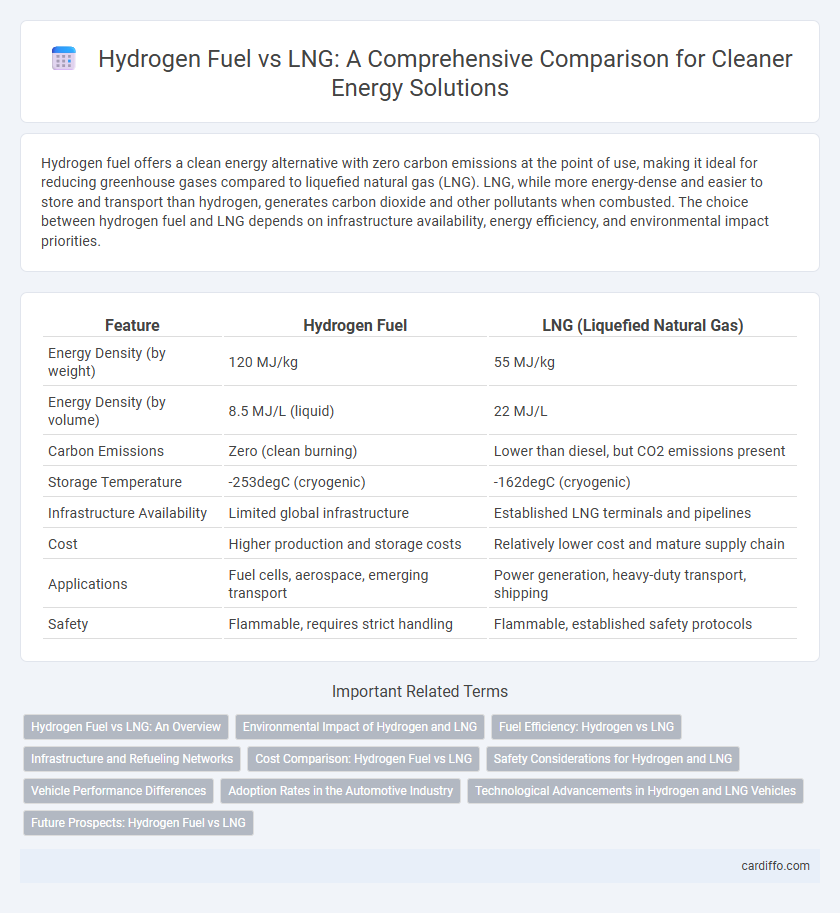Hydrogen fuel offers a clean energy alternative with zero carbon emissions at the point of use, making it ideal for reducing greenhouse gases compared to liquefied natural gas (LNG). LNG, while more energy-dense and easier to store and transport than hydrogen, generates carbon dioxide and other pollutants when combusted. The choice between hydrogen fuel and LNG depends on infrastructure availability, energy efficiency, and environmental impact priorities.
Table of Comparison
| Feature | Hydrogen Fuel | LNG (Liquefied Natural Gas) |
|---|---|---|
| Energy Density (by weight) | 120 MJ/kg | 55 MJ/kg |
| Energy Density (by volume) | 8.5 MJ/L (liquid) | 22 MJ/L |
| Carbon Emissions | Zero (clean burning) | Lower than diesel, but CO2 emissions present |
| Storage Temperature | -253degC (cryogenic) | -162degC (cryogenic) |
| Infrastructure Availability | Limited global infrastructure | Established LNG terminals and pipelines |
| Cost | Higher production and storage costs | Relatively lower cost and mature supply chain |
| Applications | Fuel cells, aerospace, emerging transport | Power generation, heavy-duty transport, shipping |
| Safety | Flammable, requires strict handling | Flammable, established safety protocols |
Hydrogen Fuel vs LNG: An Overview
Hydrogen fuel offers a zero-emission energy source with water as the only byproduct, contrasting with liquefied natural gas (LNG), which emits CO2 and methane during combustion and leakage. Its higher energy density by weight and rapid refueling capability make hydrogen advantageous for heavy transport and long-distance travel, while LNG remains dominant due to established infrastructure and lower initial costs. The transition to hydrogen fuel depends on advancements in production efficiency, storage technology, and widespread refueling networks to overcome current economic and logistical challenges.
Environmental Impact of Hydrogen and LNG
Hydrogen fuel produces zero carbon emissions at the point of use, making it a cleaner alternative to Liquefied Natural Gas (LNG), which emits significant CO2 and methane during combustion and leakage. The lifecycle emissions of hydrogen depend on its production method, with green hydrogen from renewable energy offering the lowest environmental impact compared to LNG's extraction and processing footprint. Reducing greenhouse gas emissions and air pollutants is crucial for mitigating climate change, positioning hydrogen as a more sustainable fuel option than LNG.
Fuel Efficiency: Hydrogen vs LNG
Hydrogen fuel offers higher energy content per unit mass, with approximately 120 MJ/kg compared to LNG's 55 MJ/kg, leading to greater fuel efficiency in weight-sensitive applications. However, LNG provides higher volumetric energy density, around 22 MJ/L versus hydrogen's 8-10 MJ/L, making LNG more efficient where storage volume is constrained. The overall fuel efficiency depends on factors like storage technology, energy conversion systems, and application context, with hydrogen excelling in light-weight efficiency and LNG favored for compact volumetric energy storage.
Infrastructure and Refueling Networks
Hydrogen fuel requires specialized infrastructure, including high-pressure storage tanks and dedicated refueling stations equipped with advanced safety systems, which are currently limited but rapidly expanding in urban and industrial areas. LNG benefits from an established global supply chain with extensive liquefaction plants, storage facilities, and a widespread network of refueling stations primarily serving heavy transport and maritime sectors. The disparity in infrastructure maturity significantly influences adoption rates, with LNG offering immediate scalability while hydrogen infrastructure development continues to accelerate through targeted investments and government support.
Cost Comparison: Hydrogen Fuel vs LNG
Hydrogen fuel currently incurs higher production and storage costs compared to liquefied natural gas (LNG), driven by complex electrolysis processes and the need for advanced containment systems. LNG benefits from established infrastructure and lower extraction expenses, making it more cost-effective for large-scale energy applications. However, ongoing advancements in hydrogen technology and economies of scale are gradually narrowing the cost gap between hydrogen fuel and LNG.
Safety Considerations for Hydrogen and LNG
Hydrogen fuel poses unique safety challenges due to its wide flammability range and low ignition energy, requiring stringent leak detection and ventilation systems. LNG carries risks of cryogenic burns and vapor cloud explosions, necessitating robust containment and spill response protocols. Both fuels demand specialized safety measures tailored to their physical and chemical properties to mitigate hazards during storage, transport, and use.
Vehicle Performance Differences
Hydrogen fuel offers faster refueling times and higher energy density per weight compared to LNG, resulting in improved vehicle acceleration and longer driving ranges. LNG provides greater volumetric energy density, which is beneficial for heavy-duty trucks requiring extensive storage capacity and consistent power output. While hydrogen vehicles produce zero tailpipe emissions, LNG engines emit lower CO2 but still release some pollutants, influencing performance based on environmental regulations.
Adoption Rates in the Automotive Industry
Hydrogen fuel adoption in the automotive industry remains limited due to high production costs and infrastructure challenges, with fewer than 30,000 fuel cell vehicles worldwide as of 2024. In contrast, LNG (liquefied natural gas) sees broader use in heavy-duty trucks and fleet vehicles owing to established fueling networks and lower fuel costs. Market projections indicate LNG vehicles will outnumber hydrogen fuel cell vehicles by a factor of three in the next five years, driven by current economic and logistical factors.
Technological Advancements in Hydrogen and LNG Vehicles
Hydrogen fuel vehicles leverage advances in fuel cell technology, enabling faster refueling times and longer driving ranges compared to traditional internal combustion engines. Liquefied Natural Gas (LNG) vehicles benefit from enhanced cryogenic storage systems and improved engine designs that increase fuel efficiency and reduce emissions. Both hydrogen and LNG technologies are rapidly evolving, with innovations aimed at optimizing energy density, storage solutions, and overall vehicle performance.
Future Prospects: Hydrogen Fuel vs LNG
Hydrogen fuel offers a promising future as a clean energy source with zero carbon emissions, ideal for decarbonizing sectors like transportation and industry. Liquefied natural gas (LNG) remains a significant transitional fuel due to its established infrastructure and lower carbon emissions compared to coal and oil. However, advances in hydrogen production technologies and government policies targeting net-zero emissions are accelerating hydrogen's adoption over LNG in the long term.
Hydrogen Fuel vs LNG Infographic

 cardiffo.com
cardiffo.com